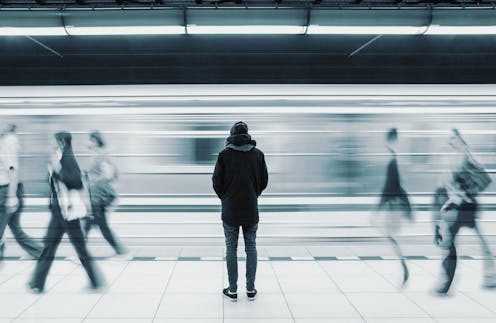Migrants' mental health can depend on the way they spend money
- Written by Haiming Hang, Reader in Marketing, University of Bath

Every year hundreds of millions[1] of people around the world move to another country, with many of them seeking economic security[2] for themselves and their families.
And research suggests that, on the whole, they manage to achieve this. Economic migrants tend to end up financially better off[3] in their destination country than they were at home.
But does becoming wealthier make them happier? Our new research[4] suggests that this depends on how migrants spend their money. And whether they use it in ways that can help them to deal with the loneliness and isolation that can come from moving to a new country.
Migrants do not always feel welcome[5] because for some people in host countries the very idea of migration remains a source of controversy and outrage. Anti-immigrant rhetoric in the media and in the political sphere does not help, of course. And global events can make things even worse, as when COVID brought the world to a standstill and many migrants reported increased levels of discrimination[6].
As a result, feeling isolation and social exclusion count among some of the most stressful factors migrants face in their destination country. In the UK, a recent report[7] suggested that 58% of migrants considered isolation to be their biggest challenge.
In our research, participants frequently mentioned similar feelings. One said: “When I moved to the USA, I felt very alone and isolated from everyone around me. Making friends was difficult because I felt like I was out of the circle, no matter how much I tried to socialise and put myself out there.”
Another told us: “I just felt isolated because I was only in the country for about four months and although I am fluent in English, I wasn’t connecting with the people around me.”
And another commented: “Just coming from a different country means that everyone around me sounds alike, except for me. That alone was kind of scary and it makes me feel like I stick out, even before we get to all the physical differences.”
Helping migrants cope with these feelings is not straightforward. Language difficulties and cultural differences can be considerable obstacles to accessing mental health care[8], for example.
But our research[9] offers a potential solution by focusing on how migrants can use their money in a way that improves their mental health. This develops previous studies that highlight the difference[10] between “material” purchases (a watch, say) and “experiential” purchases (like a holiday).
Previous studies have repeatedly found that people achieve more enduring satisfaction and happiness from experiential purchases because they help us to connect with others[11].
But we found that migrants often prefer to spend their money on material purchases, which are tangible and highly visible to others, over experiential purchases. They buy things to establish a connection with the mainstream cultures in their destination country.
Previous research suggests[12] this may be because social exclusion fosters materialism. The theory is that material possessions are treated as a kind of “happiness medicine” to combat loneliness.
Our work indicates that migrants would benefit from spending more of the money they have on experiential purchases rather than material purchases to reduce their feelings of loneliness and increase their sense of connection.
Previous research also suggests that something known as “prosocial purchases”, spending money on others rather than ourselves, can make people happy[14]. It helps people connect with others and promotes intimacy[15]. This is particularly relevant to migrants, as many of them are originally motivated to travel far from home specifically to seek the means to support family members back home.
Prosocial purchases make people feel they are having a beneficial effect on others[16], which in turn, increases social status and brings positive feelings[17]. And our study finds that prosocial purchases are even more effective than experiential purchases in increasing international migrants’ happiness.
Read more: Four ways to spend your dwindling cash that will boost your wellbeing[18]
During a global cost of living crisis, though, this kind of spending (and, indeed, all the other kinds) will undoubtedly be squeezed. The psychological and social advantages it brings will, therefore, be at risk – not just for migrants, but for everyone else as well.
References
- ^ hundreds of millions (worldmigrationreport.iom.int)
- ^ seeking economic security (www.iom.int)
- ^ financially better off (doi.org)
- ^ Our new research (doi.org)
- ^ not always feel welcome (ijoc.org)
- ^ levels of discrimination (doi.org)
- ^ recent report (migrantsorganise.org)
- ^ accessing mental health care (migrantsorganise.org)
- ^ our research (doi.org)
- ^ the difference (doi.org)
- ^ connect with others (doi.org)
- ^ Previous research suggests (doi.org)
- ^ Shutterstock/Themalni (www.shutterstock.com)
- ^ make people happy (doi.org)
- ^ promotes intimacy (doi.org)
- ^ effect on others (doi.org)
- ^ positive feelings (doi.org)
- ^ Four ways to spend your dwindling cash that will boost your wellbeing (theconversation.com)







